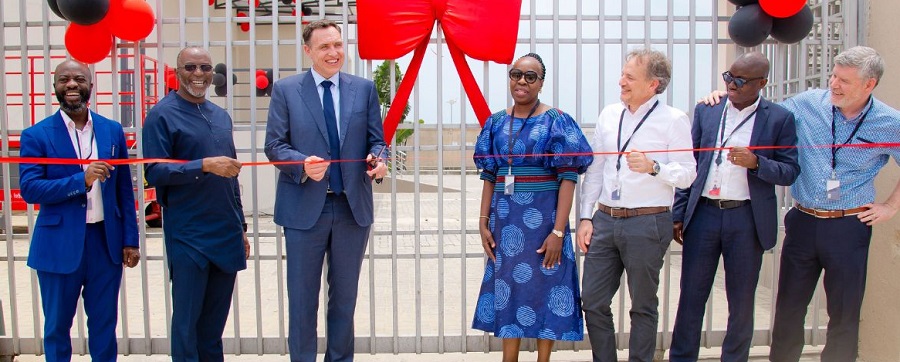E-Business
Okere, CWG Boss Brings “Lean Launch Pad” Class to Nigeria

Austin Okere, group chief executive, Computer Warehouse Group (CWG), just back from Columbia Business School, New York, where he participated as an instructor at the Steve Blank “Lean Launch Pad” Class, plans to bring the novel concept to Nigeria
The Lean Launch Pad is joining forces with Startup Weekend, Udacity, TechStars and Startup America to offer some of the world’s most effective experiential entrepreneurship education.
By combining content from the world’s leading expert in customer development with local mentors and leaders in an intensive flipped-classroom style course, the movement has been able to create a unique, effective experience for teams of entrepreneurs that are serious about growing a customer-driven startup.
The program is already being offered in 15 cities around the world, with another 25 programs launching in February. The goal is to expand the program to more than 100 cities in 2013.
Thus far, seasoned entrepreneurs such as Steve Blank are teaching NEXT in Silicon Valley, Andy Sack (TechStars Seattle founder) in Seattle, Alex Farcet (founder of Startupbootcamp) in multiple European cities, Eric Koester (founder of Zaarly) in Washington, DC with countless others joining.
The Eugene Lang Entrepreneurial Center at CBS, where Okere has been a guest lecturer since 2009, conveyed in their invitation their belief that his experience and contribution to entrepreneurial ship in emerging markets will provide unparalleled contribution to the class of aspiring entrepreneurs.
The Computer Warehouse Group, whose case study is a regular feature at Columbia Business School and the Massachusetts Institute of Technology, Boston, as well as many other institutions in Africa, including the prestigious Lagos Business School, chronicles the trials, challenges and triumph of entrepreneurship in the challenging environment that characterizes Sub Saharan Africa.
The Lean Launch Pad course provides real world, hands-on learning on what it is like to actually
start a high-tech company.
It is a practical class where the goal is to create an entrepreneurial experience with all of the pressures and demands of the real world in an early stage start up.
The syllabus for the course is drawn majorly from the bestselling book, The Startup Owner’s Manual, co-authored by serial entrepreneurs Steve Blank and Bob Dorf, and the revolutionary new book, Business Model Generation co-authored by Alexander Osterwalder and Yves Pigneur.
These two books provide insights into powerful, simple, tested tools for understanding, designing, reworking, and implementing business models, through a business model canvas, that defines unique value propositions for specific customer segments, and the relationships and channels to deliver these to the customer to maximize revenue.
It also helps the entrepreneur identify key resources, partners and key activities to be performed and at what cost.
The course provides a comprehensive step-by-step guide to getting startups right. It walks entrepreneurs through the customer development process that gets them out of the building to develop wining products that customers will buy.
There is an increasing global focus and emphasis on entrepreneurship as the most viable vehicle for job creation.
According to the Global EntrepreneurshipMonitor (GEM) 2011 report, there is an upsurge in entrepreneurship around the world, with a total number of about 400 million spread across 54 countries.
The GEM in its 2006 report revealed that there was a systematic relationship between a country’s level of economic development and its level of entrepreneurial activity. It noted that countries with similar per capita GDP tend to exhibit similar levels of entrepreneurial activity.
At low levels of per capita GDP, industrial structure is characterized by the prevalence of many very small enterprises.
As per capita income increases, industrialization and economies of scale allow larger and established firms to satisfy the increasing demand of growing markets and to increase their relative role in the economy.
On his involvement in the Block Week Course at Columbia Business School Okere said“I believe that it is better to have a thousand millionaires than a ten billionaires.
It is better still to have a million people with access to a hundred thousand dollars, if they can be taught how to nurture and grow it through entrepreneurial endeavor; and I intend to do something about it, so when I was invited, I did not hesitate in accepting, with a view to bringing the concept to Africa”.
Okere whose entrepreneurial advocacy has taken him on similar teaching expeditions across Africa; through Nigeria, Kenya and Tanzania also remarked“I like to put the story of the Computer Warehouse Group out there because such success stories contribute immensely to the attraction of capital to the region, which combined with the entrepreneurial acumen and the youthful population unleashes waves of economic boom, which in turn lifts the pile at bottom of the pyramid into the more desirable networked economy of the emerging global village. Besides, it provides the perfect opportunity to be a brand ambassador for Africa”.
Okere, one of Nigeria’s foremost entrepreneurs has made quite a name for himself over the past 20 years, growing the Computer Warehouse Group into a $130 million revenue company, with 650 staff spread across Nigeria, Ghana, Uganda and Cameroon.
In 2012 he was named ICT Man of the Decade by ICT Watch Africa Digital Network, and CWG was named Conglomerate of the Year.
The organizers cited CWG’s immense contributions toward the growth and development of Information and Communications Technology (ICT), youth empowerment through ICT education, and nation building.
In 2011 Austin was equally named the ICT Personality of the year by Technology Africa, and the most outstanding ICT Personality of the Decade in 2010 by ICT Watch Africa. He has also received the IT Personality of the Year award by the Nigerian IT and Telecom Awards, among many others.
The Computer Warehouse Group was recently ranked among the top 50 Technology Companies in West Africa, and also bagged the Award of the ICT Company of the Year 2012 by Technology Africa.
Okere who shall be participating at the Economist Group’s Nigerian Summit in March intends to take his entrepreneurial advocacy very strongly to the Forum to attract the much needed focus.
E-Business
Equinix Launches LG2.3 Data Centre in Nigeria

Equinix, global digital infrastructure company, has launched a cutting-edge LG2.3 data centre in Lagos aimed at fueling Nigeria’s booming tech scene.

Equinix officials at the launch
The data centre is designed to provide businesses with secure, reliable, and high-performance colocation and interconnection services, crucial for supporting the increasing demand for digital services across the region.
Nestled in the bustling Lekki Free Zone, LG2.3 is packed with the latest tech, offering businesses the secure and lightning-fast connections they crave. Think of it as the engine room for Nigeria’s online world, designed to handle the explosive growth of digital services.
The launch featured Bruce Owen, president, Equinix’s EMEA, who cut the ribbon to open the data centre.
“Nigeria is our focus,” Owen declared, emphasizing Equinix’s dedication to powering the nation’s digital growth. “The energy here is incredible, and we’re excited to be part of it.”
On his part, Wole Abu, managing director, Equinix’s West Africa, echoed this sentiment highlighting the increasing global demand for digital infrastructure.
“Africa is on the cusp of a digital explosion, and we’re here to support that growth,” he said.
Nigeria’s digital adoption is skyrocketing, driven by a young, tech-savvy population. Businesses are racing to embrace online platforms, and LG2.3 is perfectly positioned to meet their needs.
This investment is set to create a ripple effect, boosting the economy, creating jobs, and fostering innovation.
LG2.3 is set to be a beacon for Africa’s tech potential.
Equinix’s confidence in the continent aims to attract more global players, turning Africa into a digital powerhouse.
This data centre will act as a vital connection hub, empowering businesses to connect and collaborate, bridging the digital divide.
Equinix’s vision extends beyond Nigeria, with plans to expand across Africa.
strategic move reflects their commitment to building a connected and thriving digital ecosystem.
The success of LG2.3 is a testament to the power of public-private partnerships, with the Nigerian government playing a crucial role in attracting investment.
As Nigeria marches towards a digital future, Equinix’s LG2.3 data centre will be a key driver of progress. It’s a powerful symbol of Nigeria’s digital ambition and a catalyst for Africa’s tech revolution.
E-Business
Microsoft Marks 50th Anniversary with Major Copilot AI Update

Microsoft is celebrating its 50th anniversary with a major leap forward into artificial intelligence, unveiling significant updates to its AI assistant, Copilot.

The announcement was made on April 4, 2025, at the company’s headquarters in Redmond, Washington, marking a milestone for both Microsoft and the AI industry.
As the tech giant celebrates its golden anniversary, the company is setting its sights firmly on the future, particularly with its AI-driven tools.
Microsoft’s Copilot, which has been integrated into various software tools across its ecosystem, has now received a significant upgrade.
The new features aim to make the Copilot assistant more intelligent, personalised, and proactive, which positions Microsoft as a serious competitor in the AI space against other industry leaders such as OpenAI’s ChatGPT and Anthropic’s Claude.
Mustafa Suleyman, head of Microsoft’s AI division, expressed the company’s ambition, saying, “We envision Copilot not just as an assistant, but as a long-term AI companion, one that can learn, adapt, and evolve alongside its users. This goes beyond just responding to commands; it’s about fostering relationships between users and their AI.”
The most notable update to Copilot is its new memory functionality. Now, the assistant can retain information such as preferences, previously used commands, and even personal context, making it more responsive and efficient in future interactions.
This means Copilot can, for example, anticipate a user’s needs based on past behaviours, from scheduling meetings to suggesting restaurants for a night out.
In addition to the memory features, Copilot’s new “Vision” capabilities extend the AI’s functionality across multiple platforms. Windows and mobile users will now be able to interact with Copilot using both the camera and on-screen elements.
This includes actions such as booking appointments, managing tasks, and even shopping online — all in a more interactive and seamless way.
Scott Guthrie, Microsoft’s Executive Vice President, shared his enthusiasm about the potential of these advancements, stating, “With these new capabilities, we’re not just reacting to AI’s capabilities — we’re shaping the future of how users interact with technology. AI can do so much more than just assist with tasks. It can enrich the human experience.”
The updated Copilot is designed to challenge industry competitors like ChatGPT and Claude, offering more personalised and context-aware interactions.
Microsoft has positioned its Copilot as a tool that not only assists users but builds a deeper, more intuitive relationship over time.
The company has also placed a strong emphasis on AI accessibility. With AI’s growing role in everyday tasks, Microsoft aims to make it easier for users to adopt and benefit from these technologies, regardless of their technological proficiency.
Despite past challenges, including legal disputes over privacy and AI ethics, Microsoft continues to push boundaries in the AI space. Guthrie remarked, “This is just the beginning. As we continue to innovate, we are reshaping how people work, interact, and live with technology.”
With Copilot’s advancements, the tech giant hopes to continue its legacy of innovation, making AI tools accessible and useful for people around the world.
E-Business
Report Suggests a Slash in Mobile App Usage By 2027 Due to AI Assistants

By 2027 mobile app usage will decrease by 25 per cent due to AI assistants according to Gartner, Inc. Smartphone users will turn to AI assistants, such as Apple Intelligence, ChatGPT, Google Gemini, Meta AI, and others to replace apps for many functions.

In addition to the impact of AI assistants, apps will be consolidated across separate brands and companies, creating mobile app partnerships or consortiums to reach more users per app at scale and defray the cost of creation and maintenance.
“CMOs should begin scenario planning for the impacts of decreased mobile app usage,” said Emily Weiss, Senior Principal for the Gartner Marketing Practice.
“Brands with low app engagement and retention will likely be first impacted – this will be a positive development for brands that are not overly reliant on driving revenue via apps as app development costs will decrease.
Other brands may be severely impacted by the disintermediation of users turning to AI assistants for services. The loss of app users will also result in the loss of first-party data collection and the ability to reach fewer users via mobile push notifications,” Emily added.
By 2026, Over 1/3 of Web Content will be Created for the Purposes of Gen-AI Powered Search According to Gartner’s 2024 CMO Spend Survey of 395 respondents between February and March 2024, the average CMO allocated almost a quarter of their digital marketing budget to search.
Other than end users directly visiting a website, search currently drives more traffic to the average commercial enterprise website than any other referral source.
Given this, a loss of search driven traffic due to algorithmic shifts by major search engines would result in tangible, negative commercial impact to any organisation.
“CMOs will need to direct their teams to hire talent with a strong understanding of how GenAI, and broader AI influences, impacts the performance of their content in search algorithms,” said Weiss.
“It will be important to upskill the function by investing in search and content talent with AI skillsets. These associates will need to have familiarity with creating or optimising content to train and rank within evolving search algorithms,” she said.
By 2028 digital Mlmarketers will move 30 per cent of their paid social budget to support advertising and partnerships on subscription-based channels It is becoming more challenging for CMOs to maintain, let alone grow, their reach and engagement among consumers.
This is especially true as consumers shift their tech and media behaviors away from social media, to other platforms and subscription based channels.
Gartner’s 2024 CMO Spend survey found that since 2022, paid social has maintained the highest budget allocation for all digital media spend. In 2024, B2C Marketing leaders reported allocating 14.3 per cent for their digital channel budget to social media advertising (an increase from 12.3% in 2023).
“Closed group communities and subscription channels of – fer a potential alternative for social media weary consumers and content creators who want to do more than feed the algorithm,” said Weiss.
“Brands can leverage closedgroup subscription channels – such as Substack, Patreon, and Discord – and the professional creators on them to reach relevant target audiences who are already engaging with content they self-selected into consuming,” she added.
Current AI models, such as large language models (LLMs), lack the agency to autonomously execute tasks and adapt in complex environments.
However, as new levels of intelligence are added, new AI agents are poised to quickly become more capable and reliable as brands seek to address customer facing use cases.
“There will be more AI agents than people, so while current approaches require humans in the loop, this idea will quickly become antiquated.
Marketers will need to determine when and how they can trust AI agents to act on behalf of the brand and customers across key areas,” said Weiss.

 General News2 days ago
General News2 days agoAirbnb Community Fund Donates ₦13 Billion to Nonprofits Worldwide

 General News2 days ago
General News2 days agoNigerian Military Makes History with Africa’s First Attack Drones, Bombs

 News2 days ago
News2 days agoShell, Renaissance Face Legal Action over SPDC Licence Transfer

 Telecom2 days ago
Telecom2 days agoNigeria Heads Anglophone Data Protection Committee

 E-Business2 days ago
E-Business2 days agoKike, Nigerian Tech Firm Launches ‘Kike AI’ for Kitchen Innovation

 E-Financial2 days ago
E-Financial2 days agoSterling Bank Makes Online Transfer Charges Free of Charge

 News2 days ago
News2 days agoWorld Bank Approves $1.08Bn Loan for Nigeria

 Telecom2 days ago
Telecom2 days agoHow MIP Is Making a Difference in The Media Landscape



























